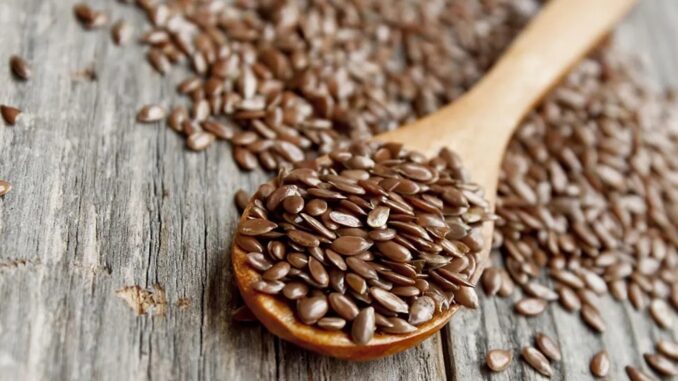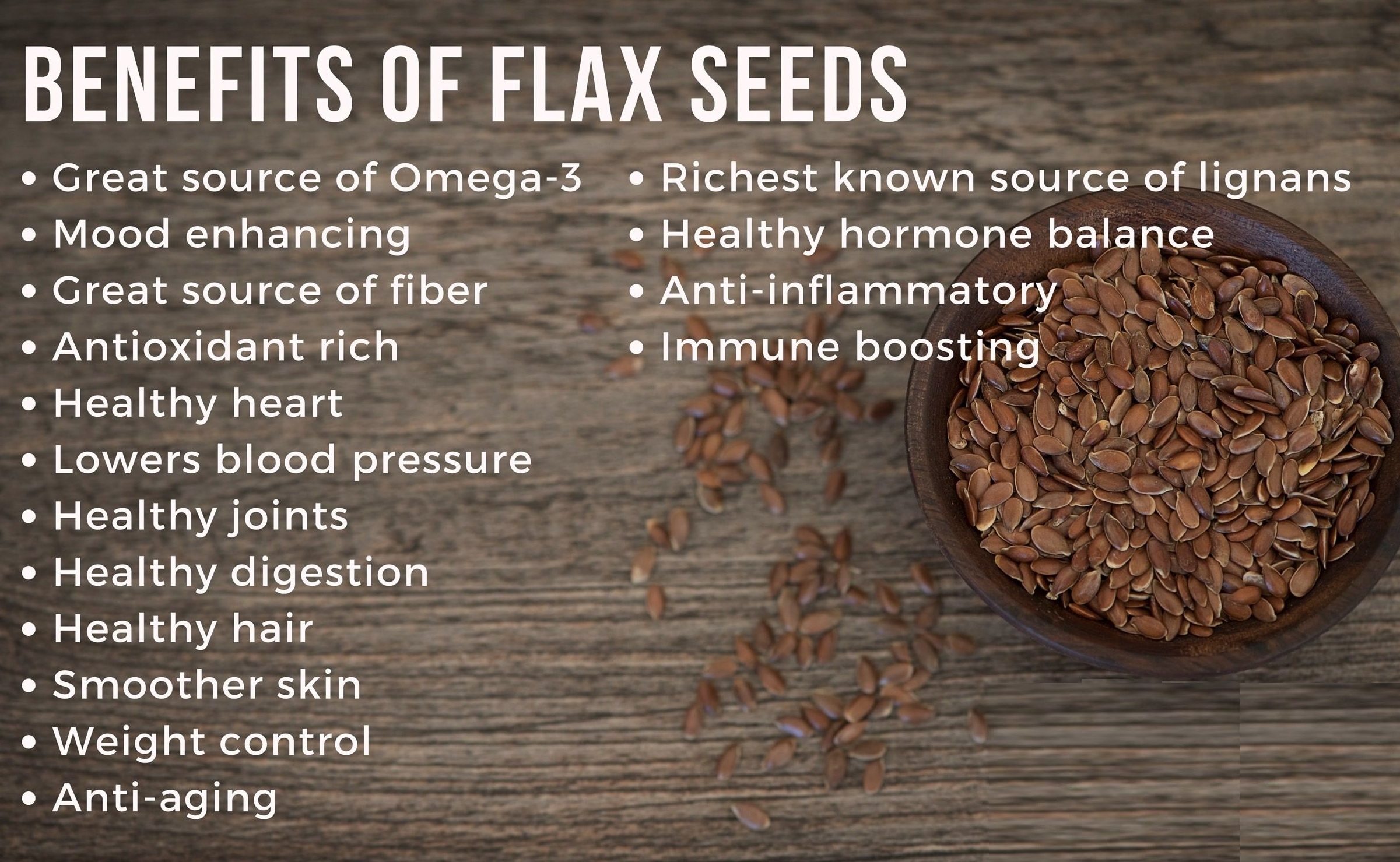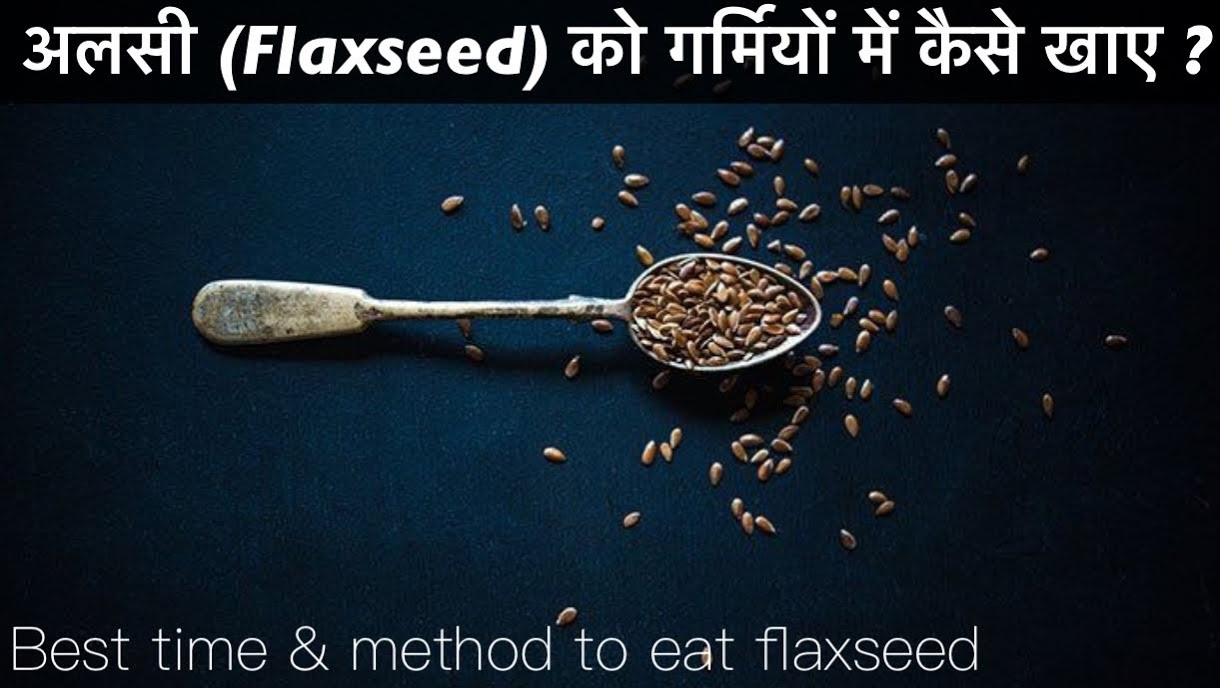
Incorporating flax seeds into your diet has several advantages: In terms of nutrition, flaxseeds are nothing less than a powerhouse. More than 6,000 years ago, this food item was used by people all throughout the world. Flaxseeds are also known as linseed. This type of seed comes in a variety of brown, golden, or tan hues.
Many sections of the human body can benefit from flaxseeds. There are a number of health benefits associated with a healthy diet that includes improved digestion and a lower cholesterol level. Omega-3 fatty acids and alpha-linolenic acid are both abundant in these seeds.
See Also: Super Foods That Boost Your Brain
Table of Contents
The following is a list of the top nutritional benefits of flax seeds:

Flex seeds are well-known for their medicinal properties.
- Antibacterial property
- antiviral property
- Antifungal property
- Antioxidant property
- Anti-inflammatory
- Skin regenerative property
- Cardioprotective activity
1. Increased Consumption of Whole Grains
It’s one of flax seed’s most tempting advantages because it contains large levels of mucilage gum. Mucilage is a water-soluble gel-forming fibre that has numerous benefits for the gastrointestinal tract. Mucilage also aids in maintaining a feeling of fullness in the stomach. Bodybuilders should eat flaxseed, one of the best meals for muscle growth. Allowing the food in your stomach to pass through your small intestine at a slower rate will prevent you from feeling hungry from time to time. This enhances the absorption of nutrients.
They also contain soluble and insoluble fibre, which is an interesting fact. Detoxification of the colon is helped, sugar cravings are lessened, and weight loss is sped up.
2. Maintains the health of your hair and skin
Flax seeds have the advantage of being simple to consume and include in your daily diet. If your hair, skin, and nails have been a long-term goal of yours, consider incorporating flax seed oil and flax seeds into your daily smoothie. In addition to ingesting them, flax seeds can be applied topically to the skin with the addition of additional essential oils.
Flax seeds contain ALA fats, which are good for the hair and skin because of their ability to absorb water. As a bonus, it contains b-vitamins, which help reduce the appearance of flakiness and dehydration. Acne, rosacea, and eczema can all be alleviated by eating flax seeds.
3. Weight loss aid
According to studies, regularly eating flax seeds helps with weight loss. Flax seeds are a good source of dietary fibre. As a result, fewer calories are consumed, and hunger pangs are alleviated. Inflammation can also be reduced by ALA lipids. Sprinkle flaxseeds over salads, soups, and other foods to boost your weight loss efforts.
4. Reducing LDL (bad) cholesterol
Fat and cholesterol can be trapped in the digestive tract because of the presence of soluble fibers in flax seeds. It prevents them from being assimilated. The gallbladder’s bile, which comprises cholesterol, is likewise caught by this fibre. The body is driven to produce more bile when the digestive system removes it. The extra cholesterol in the blood is used up, and the cholesterol level is lowered as a result.
5. Antioxidants in abundance
Fiber-related polyphenols found in flax seeds and lignans provide anti-aging, anti-aging, and cellular health effects. Antibacterial and antiviral activities are also present in lignans. Thus, flaxseed ingestion can minimize the risk of flu and colds. Antioxidants abound in these seeds. Polyphenols help probiotics thrive in the gut and help the body get rid of yeast and candida.
Finally, flaxseed has a vital role to play in the lives of people who suffer from digestive issues. If you are experiencing constipation, consume one to three tablespoons of flax seeds with a glass of carrot juice. Flax seeds’ insoluble fibres are excellent for soothing upset stomachs.
6. It prevents the development of cancer
Breast Cancer
Lignans in flaxseed may behave like oestrogen in the body, but scientists aren’t sure if flaxseed would be detrimental or beneficial for breast cancer. The subjects of the supplementation research were postmenopausal women with newly diagnosed breast cancer. For a period of 40 days, each subject was given a muffin containing 25 grams of dietary flaxseed. In postmenopausal women with breast cancer, researchers found that increasing their intake of flaxseed slowed the growth of their tumours.
7. Controls Diabetes
The efficacy of flaxseed powder supplementation in diabetes treatment was investigated by the WHO. One month’s worth of flaxseed supplementation resulted in significantly lower fasting blood sugar and HbA1C levels for diabetic participants than did a placebo group. There may be a little benefit if a person’s blood sugar levels are already under control.
Flaxseed Consumption Methods
Children
Flaxseed oil or roasted ground flaxseed can be added to a child’s diet to strengthen their immune system and cognitive development. Pancakes and fruit purees can benefit from the addition of ground flaxseed.

Adults
Flaxseeds can be ingested with water if they are roasted or crushed. Consume items like sandwich spread, yogurt, egg dishes, and breakfast cereal that include flaxseed to reap the benefits. As a supplement, flaxseed oil capsules can be consumed. There is a substantial risk of rancidity when using flaxseed and flaxseed oil. As a result, storing it cold will help it stay fresh longer.
Caution
- Flaxseeds should be avoided by women with cancer of the breast, uterus, ovaries, or endometriosis. They may act as estrogens in the body.
- Flaxseed should not be used by people who have intestinal obstructions or irritated bowels. It’s a good source of fibre. It could worsen the problem.
- Take flaxseed, ground, with plenty of water.
- For those on blood thinners, omega-3 fatty acids may increase the risk of bleeding. They are not to be combined.
- Flaxseeds have been shown to reduce blood sugar levels. Flaxseeds (ALA) should only be used under the guidance of a doctor if you are on diabetes medication, including insulin.
- You may be able to change your hormone levels by eating flaxseed. This could make oral contraceptives or hormone replacement therapy (HRT) less effective.
Read Also: 10 foods you should avoid eating at night

Leave a Reply